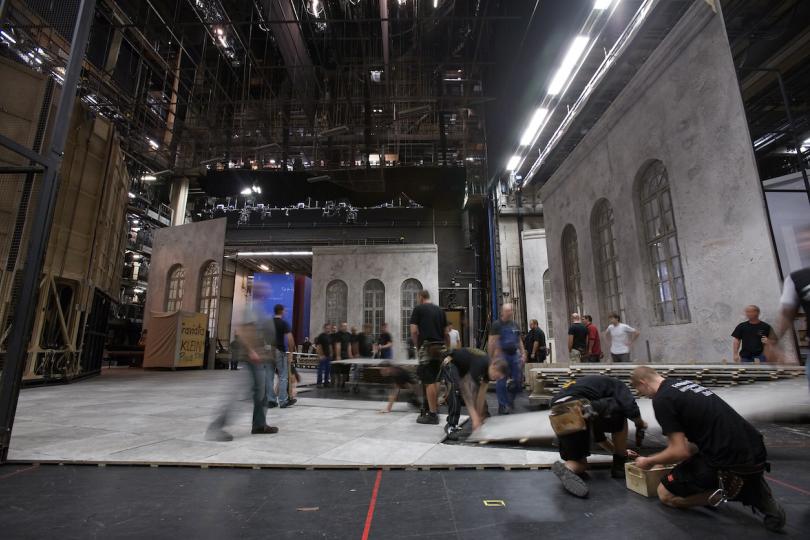The problem of the unpaid intern

I’m in rehearsal for My Children! My Africa! at Park Square Theatre, serving as the dramaturg for the production. One of the actors is chatting with me during a break, asking why I chose dramaturgy and how I wound up in theater. I tell her this is the first production I’ve worked on solo and that I’m unpaid.
The look on her face spoke volumes.
“How can they not be paying you?” she cried. “You have to ask them to pay you!”
I’ve been working in the Twin Cities theater community since 2013. Slowly, I’ve worked my way through box office and front of house and into dramaturgy and playwriting. I’ve had six unpaid work experiences, three of which I consider internships, the other three which were unpaid production dramaturgy gigs.
I’m incredibly grateful for the experiences I’ve had here in the Twin Cities and the connections I’ve made. From one inquiry email sent to a theater at just the right time, I was taken on as a summer intern, then as front of house staff, and eventually was asked to work on a show because of my interest in dramaturgy. With more query emails, I ended up at Park Square on My Children! My Africa! which led me to work on another Park Square production and back to the original theater for another show this coming spring.
But as my experiences grow, I’m concerned with the lack of paid experiences I’ve had. The actor from Park Square hasn’t been the first, and she won’t be the last to show shock that I willingly work without compensation. The Fair Labor Standards Act allows companies to provide unpaid internships as long as interns benefit in an educational way, don’t cause jobs for existing employees to be limited, and an employer doesn’t gain something from having the intern on staff.
The typical path forward
I started out in theater with an internship in the education department of the Guthrie. I did small office tasks, such as making copies and making sure that teaching instructors had everything they needed for their evening classes. I was also the onsite representative for the department during these classes and followed up with students regarding payment and questions they might have. While the line between internship and job felt blurred from time to time, I was compensated with free enrollment in the classes as well as comps to Guthrie shows. Since internships at the Guthrie are geared towards current students or recent graduates, there was an educational feel to it and understanding that I was learning about the world of theater, not working solely on my own.
The following year I worked with Theatre Pro Rata in what they described as a dramaturgy observer. I attended rehearsals for one of their productions, saw how their dramaturg researched and interacted in the production process, and spoke with her after each show about what I observed during rehearsal. I didn’t provide anything towards the production, but learned a great deal, especially in knowing what it’s like to be in the rehearsal room.
Around the same time, I was offered a dramaturgy internship with another theater, where I created information packets to be used by educators and groups to gain historical knowledge and background on the productions. While my writing and the writing of other interns wasn’t the only inclusion in the packets, we were doing work that would have otherwise fallen to staff members at the theater.
What happens next?
At this point in my career, I’ve worked on three productions that I can’t describe as internships because I wasn’t under the supervision of anyone (any more than actors are under the supervision of their director). It was a learning experience in the way that any job is, but I provided work in the same way a paid dramaturg would. If the lines of benefiting an organization were blurred in my previous experiences, they have been completely erased now.
For each production, I attended as many rehearsals as possible, all the way through tech, producing information packets for the actors and creative team, and providing line notes when the actors went off-book. For the Park Square productions, I also created lobby displays, aiming to engage audiences before and after they watched the performance and, for both theaters, I wrote blog posts focused on the production. I know my work matters – actors have personally thanked me for the information I gathered, directors have praised my research and my presence in rehearsals, members of the marketing department told me how much patrons enjoyed the lobby displays.
With these gigs, I know I’m providing services that are benefiting theaters. Let me be clear: I also know that I’m new to the rehearsal room. Right now, I am more concerned about gaining experience than I am in arguing for a paycheck, and I know how tight a budget at a theater can be. While interning at the Guthrie, I saw one of the full-time staff members in my department lose her job due to budget cuts and could feel the tension around meeting the end of the year fiscal goal. Working box office has added to this knowledge and, while budgets might look better now than a few years ago, a similar tension persists. Legally, we might say I was a “volunteer” rather than an “intern” for these productions.
Why pay is really important
But not paying interns or newcomers to the theater community doesn’t encourage growth or encourage those of us who’ve been willing and able to risk the lack of income to build what we love. I’m not interested in proving myself in a “the survival of the fittest” game of who’s willing to tough it out the longest. My work has inherent value, and I believe at this point I deserve compensation for the work— not compensation for eventually enduring years of unpaid labor.
I’ve been very lucky so far – I’m an only child with parents who are willing to buy me groceries or dinner once in a while. They understand my choice of an artistic life. I don’t have debt from college, and I’ve been fortunate enough to be accepted into an MFA program, which I hope will give me a little more clout when asking for wages.
And while I am still working for free sometimes, I have also gained paying jobs, such as working on an upcoming production at the History Theatre. Yet, as I see friends who are in the same quandary and have the same frustrations, I continue to wonder why have so many unpaid experiences become the norm? If I were taking an internship in computer science, as a friend constantly reminds me, I’d be paid, and paid well. Theater is not as profitable as computer science, but why don’t we have the same regard for our interns?
I am not the only person in this situation – there are dozens of other individuals doing better work than I for less thanks, no compensation, and less recognition. Of course, as a writer, I spend plenty of time working without pay. In those instances, it’s about the process of creating and growing something on my own.
As a dramaturg, however, I’m supplying my work to something much larger than myself. The Fair Labor Standards description of what is an unpaid intern is vague, but it’s clear that many of us provide services that benefit theaters without ever being properly compensated for it while some of us never get the opportunity to contribute because we simply can’t take the income hit that accepting an unpaid job would bring.
As theaters continue to discuss diversity and opening the doors to younger theater creators, I encourage them to ask: What would happen if we started paying interns?




